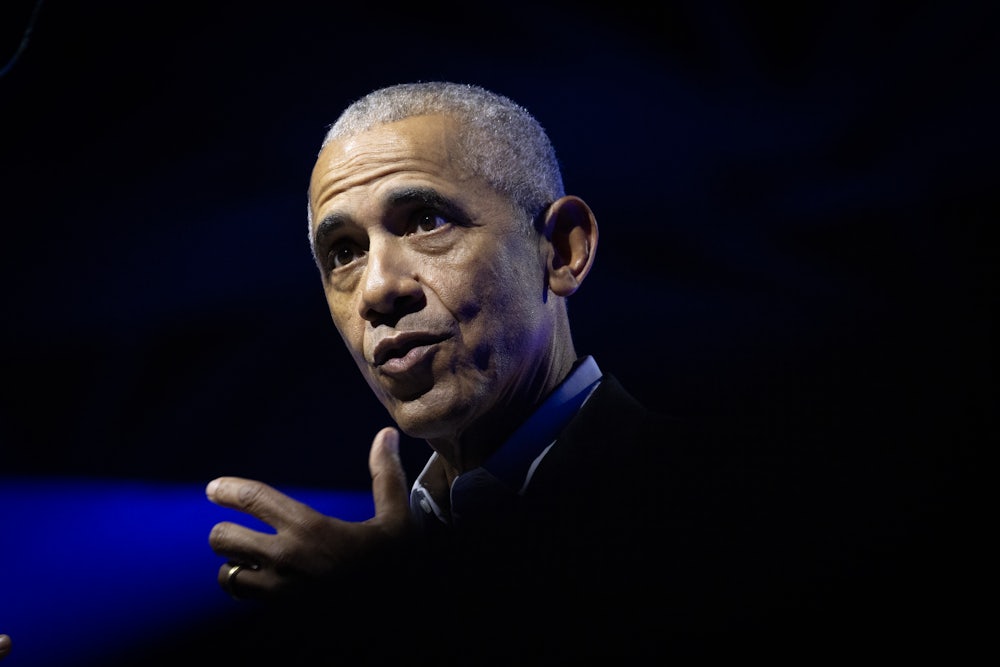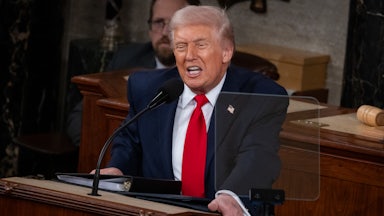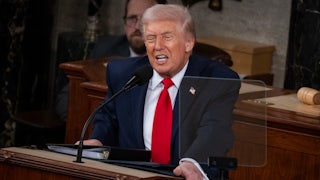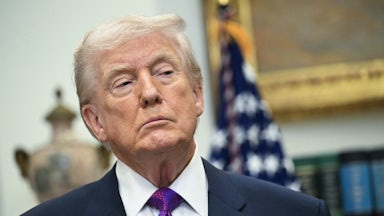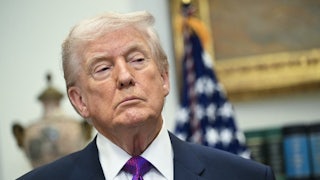For months now, Democrats have been eating themselves alive with an internal argument over how aggressively to criticize Trump’s destruction of the rule of law and constitutional order. Some Democrats think raising this is mostly a waste of time, and if raised, it must feature a quick pivot to prices. By this account, Democrats face a choice: Either attack Trump’s lawlessness or indict his degradation of people’s everyday material conditions. Do the former, and you’re distracting from the latter—the only real lifeblood of politics.
Barack Obama just made some remarks that are starting to get attention for their stirring indictment of Trump’s lawless abuses of power. That a former president is expressing deep alarm about the precariousness of the rule of law under one of his successors is certainly big news.
But looked at another way, Obama’s comments also offer Democrats a way out of the either-prices-or-democracy cul-de-sac that has flummoxed the party. What they underscore is this: Trump’s destruction of the rule of law and his imminent wreckage of the economy are actually the same story.
Obama prefaced his remarks—delivered in a question-and-answer session at Hamilton College—by declaring that he has “deep differences of opinion with my most immediate successor, who’s now president once again.”
Though Obama didn’t say the word “Trump,” he harshly criticized Trump’s most lawless innovations. He declared himself “deeply concerned” that the government is threatening universities, and “troubled” by the White House’s bullying of law firms.
Obama also said this, per a transcript from his office:
Imagine if I had pulled Fox News’ credentials from the White House press corps.… Imagine if I had said to law firms that were representing parties that were upset with policies my administration had initiated, that you will not be allowed into government buildings. We will punish you economically for dissenting from the Affordable Care Act or the Iran deal. We will ferret out students who protest against my policies. It’s unimaginable that the same parties that are silent now would have tolerated behavior like that from me, or a whole bunch of my predecessors.
That’s all good stuff. But the key line that’s directly relevant to center-left debates right now was easy to overlook.
“People tend to think, eh, democracy, rule of law, an independent judiciary, freedom of the press—that’s all abstract stuff because it’s not affecting the price of eggs,” Obama said. “Well, you know what? It’s about to affect the price of eggs.”
When I first read this, I immediately suspected a hidden message at work. Most obviously, he’s saying voters—the “people” he mentions—tend to overlook the importance of liberal democratic institutions. But Obama is also saying that Democrats should not necessarily let that reading of what “people” think constrain their approach to this precarious moment.
Indeed, a person familiar with Obama’s thinking tells me that he did intend to model an approach for Democrats to follow, that he sees the eggs-versus-democracy debate as a false choice for the party.
Trump’s imposition of extraordinarily reckless tariffs on an enormous swath of imports from around the globe gives Democrats an exit from that false choice. Most obviously, it’s a fat target for Dems who want everything to be reducible to the price of eggs, given that the tariffs are expected to boost prices on everything from cars and gas to cell phones and computers to lumber and housing to, well, eggs.
But what’s also crucial here is that this couldn’t be happening without an extraordinary and grotesque abuse of power on Trump’s part. Trump has invoked the International Emergency Economic Powers Act of 1977, or IEEPA, which he says gives him the authority to unilaterally impose global tariffs in a national emergency.
But to justify that claim, Trump is citing … the trade deficit. His executive order on tariffs actually says our “large and persistent trade deficit” poses a “national emergency,” claiming it has hollowed out U.S. manufacturing while making us dependent on supply chains controlled by foreign adversaries.
This is a ludicrous assertion of power, and it’s almost certainly illegal. As Ilya Somin details, the IEEPA requires not just a presidential declaration of a national emergency; it also requires an “unusual and extraordinary threat” to the nation. Noah Smith usefully explains why the core idea here—that trade deficits impoverish our country—is absurd. Beyond that, there’s no plausible way they rise to the sort of emergency that can trigger these broad authorities.
The key point is this: Without this abuse of power, Trump could not be unleashing such havoc. In short, Trump’s lawlessness and his economic destruction are the same story: The former doesn’t just enable the latter; the two are inextricably entangled with each other.
This is not tantamount to claiming that Democrats can only indict Trump’s assault on the rule of law when it impacts “kitchen table” concerns. Rather, it’s to say that rule of law, stable institutions, and constraints on everything from bureaucratic corruption to dictatorial abuses of power facilitate economic prosperity and flourishing. Dramatically erode those things, and the economy very well may follow in short order. That’s what Obama was getting at when he said:
We take for granted the idea that we don’t have to pay bribes or hire somebody’s cousin in order to get a business permit. That’s how we built the economy we did. That’s why this place worked. It has very concrete impacts on all of our lives.
The data analyst David Shor recently told Ezra Klein that Democrats must avoid the “trap” of focusing too much on “defending institutions and democracy” rather than remaining “economically focused.” Shor also told Eric Levitz that the lesson of the 2024 loss is that voters care more about “economic change” than about “preserving America’s institutions.”
In this telling, voters—particularly working-class ones—want leaders to focus on the economy and don’t want them to be too concerned with the health of existing liberal democratic institutions. The answer to this is usually said to be “economic populism,” which is economically focused without appearing too solicitous of the institutional status quo.
Left-leaning economic populism does appear to be the way forward for Democrats. But it can’t be right that this diminishes the case for a full-throated party-wide indictment of Trump’s abuses of power and efforts to dismantle the rule of law.
There’s a way to make the argument that Trump’s legal and constitutional degradations are terrible for the material conditions of working people—this is what Obama was signaling—and to stand up for the rule of law while simultaneously favoring robust institutional reform.
Other Democrats, meanwhile, don’t want to defend the rule of law in cases where it might make them appear vaguely leftist. Brian Beutler flags this example of Senator Ruben Gallego suggesting Democrats should mute criticism of Trump’s deportations to foreign gulags:
U.S. Sen. Ruben Gallego said Trump has set a political “trap” for Democrats with his deportations of Venezuelans to El Salvador. In an interview with the Star, Gallego also said he maintains qualified support for sending migrants to El Salvador, “if they are dangerous.” tucson.com/news/local/s...
— Emily Bregel (@emilybregel.bsky.social) March 22, 2025 at 3:56 PM
[image or embed]
This is just evasion masquerading as faux savvy. As Beutler says, Democrats should be willing to make the case that “we don’t live in a dictatorship” and “we don’t send secret police to drag people off the streets” because of their “tattoos,” simply because this “cuts right to the heart of what the country is.”
But even Democrats who feel skittish about being so daring can look at what Obama is now doing. Note that Obama cites the jailing of foreign students for their views (which might seem riskily leftist to the likes of Gallego) and casts it as a symptom of a broader Trumpian wrecking of our institutions that is threatening our economic stability as well.
Democrats can make such arguments. Really, they can! Obama has opened the door for them to think more seriously about doing just that—and this time, getting this right.
